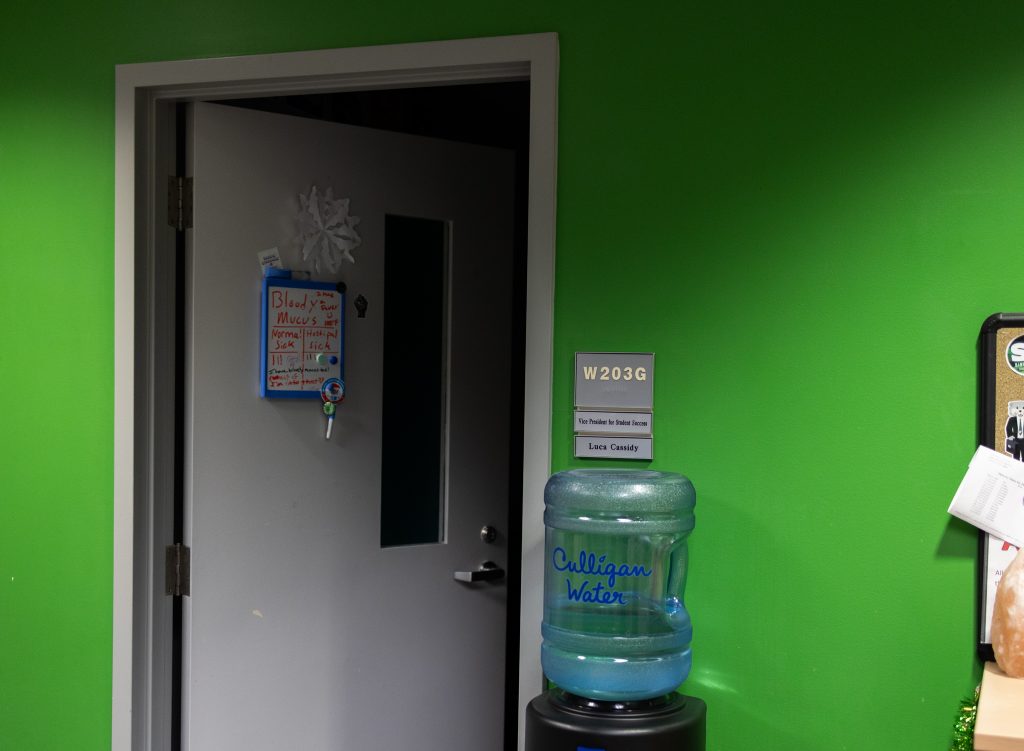In an effort to increase support for survivors of sexual- and gender-based harassment, violence or discrimination on campus, student advocates collaborated with the Student Association (SA) to create the Title IX Peer Advisors Program.
Spearheaded by KT Fitzgerald, the Binghamton University Feminist Collective senior advisor, communications organizer with the organization Know Your IX and a senior majoring in psychology, the program is meant to cater to the diverse needs of claimants navigating Title IX grievance processes. Beginning in 2023, the Title IX Peer Advisors Program aims to provide comprehensive support, including guidance through the complex web of Title IX procedures, awareness of rights at federal, state and SUNY-wide levels and assistance in accessing supportive measures and accommodations.
Frank Rizzo, director of the Title IX Peer Advisors Program, an SA advocate and a junior majoring in biochemistry and philosophy, politics and law, explained why the program was created.
“The [SA] Title IX Peer Advisors program was founded to provide claimants who are pursuing Title IX grievance processes — including, but not limited to, survivors and victims of sexual/gender-based harassment, violence or discrimination — with adequate support through a peer advising program,” Rizzo wrote. “Ensuring that claimants know which supportive measures and accommodations they are entitled to, and referring claimants to the appropriate on- and off-campus services or professionals based on a claimants’ individual needs and circumstances.”
The program falls under the vice president of student success (VPSS) office, and Luca Cassidy, the current VPSS and a junior double-majoring in economics and sociology, helped create the program with Fitzgerald and Rizzo.
Applications for the Title IX Peer Advisors Program opened on March 11, welcoming “hard-working” students passionate about advocacy and peer-to-peer support. Those accepted will undergo two mandatory training sessions and dedicate approximately five hours per week to their roles.
According to the Binghamton Title IX website, it is prohibited to exclude or discriminate against any individual on the basis of sex in any educational program or activity that receives federal financial assistance in the United States. Title IX safeguards students from sex-based discrimination and harassment, encompassing behaviors like sex stereotyping and harassment rooted in gender identity or expression.
Andrew Baker, senior compliance officer and Title IX coordinator, explained that the Title IX office met with the students planning this initiative in October 2023. The office does not currently have any collaborations planned but is open to considering them moving forward. Baker described the Title IX coordinators’ role and highlighted other available services, like accommodations for pregnant students.
“The roles of Title IX Coordinators include receiving reports, coordinating campus response, ensuring training/education is provided to the campus community and providing reporting individuals with accommodations and services during an investigation,” Baker wrote.
Referrals to the CARE Team or VARCC may be offered to students when deemed appropriate and desired, and developments are already underway, including a peer-to-peer support and victim advocacy training curated through a partnership with VARCC and other programs.
Fitzgerald emphasized that there are no significant alterations anticipated for the program. However, they have been considering reaching out to colleagues at other SUNY institutions to explore the possibility of adapting the program for their campuses. Given the demand for peer support networks and similar resources, Fitzgerald said they believe there’s potential for their model to be replicated.
“This program is necessary because of the countless survivors who have been failed here at [BU], within the SUNY system and at educational institutions across the entire United States,” Fitzgerald wrote. “Experiences of violence and harassment can seriously impede a student’s access to their education, often yielding dire negative consequences for one’s social, emotional, financial and/or academic well-being.”
According to Fitzgerald, the potential civil, legal and financial ramifications associated with enforcing Title IX policies lead educational institutions to often approach Title IX processes primarily as a means of risk management rather than prioritizing the survivors’ safety and comfort. Know Your IX’s 2021 report, “The Cost of Reporting,” stated that 39 percent of survivors surveyed were compelled to take a leave of absence, transfer or drop out.
Rizzo commended the Title IX office’s work but emphasized their small size. By establishing the Title IX Peer Advisors Program, Rizzo, Cassidy and Fitzgerald aim to bridge the gap and provide additional support, expressing their belief that students may feel more comfortable reaching out to peers during challenging times.
“Clearly, there is a need for more transparency and accountability in the Title IX conduct process, and there is also a need for more supportive environments for survivors,” Fitzgerald wrote. “By providing this resource, we are attempting to circumvent institutional bias so that claimants can rely on a peer rather than a University employee to guide them through the process, which could also be more comfortable and less intimidating for folks than speaking and working with an ‘adult.’”



